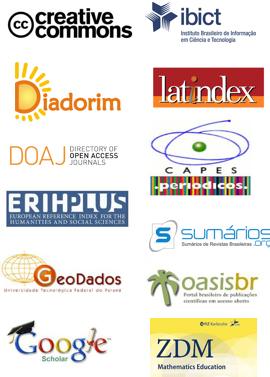Conhecimentos Específicos da Área nas Matrizes Curriculares da Licenciatura em Matemática
DOI:
https://doi.org/10.17921/2176-5634.2023v16n2p207-216Resumo
O presente artigo decorre de uma pesquisa desenvolvida no âmbito da organização curricular de um curso de Licenciatura em Matemática e tem como objetivo discutir as mudanças ocorridas historicamente no que se refere à matriz curricular, mais especificamente referente aos Conhecimentos Específicos da Área. Inicialmente foi feito o levantamento das matrizes curriculares que foram sendo constituídas, desde sua implementação, obtendo-se dados referentes às que foram implantadas nos anos de: 1979, 1995, 2001, 2005, 2013 e 2019. A partir destas, foram estudados os seguintes elementos: semestres, nomenclaturas, maior e menor carga horária, diferença entre as cargas horárias, quantidade de disciplinas ofertadas, carga horária total. Os dados permitiram identificar a drástica diminuição do percentual das disciplinas referentes aos Conhecimentos Específicos da Área ao longo das reformulações curriculares, destacando-se as referentes ao Cálculo Diferencial e Integral, com maior redução. Esta redução pode ser explicada pelas imposições das legislações, em que os currículos vão sofrendo reestruturações e modificações decorrentes delas, bem como pelo avanço das discussões da área da Educação Matemática sobre formação de professores ao longo dos anos, que têm levado à discussão sobre a formação para além do conhecimento específico da matemática. Por fim, constata-se que só a matriz curricular não expressa a totalidade da organização de um curso de licenciatura, mas é um dos elementos que apontam indicativos para se pensar sobre a formação inicial do professor para a Educação Básica.
Palavras-chave: Currículo da Licenciatura em Matemática. Formação Inicial de Professores. Conhecimentos Específicos da Área de Matemática.
Abstract
This article derives from a research developed within the scope of the curricular organization of a degree course in Mathematics and aims to discuss the changes that have taken place in the curriculum of this Course, referring to Specific Knowledge. Initially a survey of the degree curriculum, historically constituted since their implementation was carried out, with data referring to the curricular matrices that were implemented in the years of: 1979, 1995, 2001, 2005, 2013 and 2019. From these were identified the following elements: semesters, nomenclatures, longer and shorter workloads, difference between workloads, number of courses offered, total workload. The data allowed us to identify a drastic decrease in the percentage of subjects related to specific knowledge in the area throughout the curriculum reformulations, highlighting those related to Integral and Differential Calculus, with a greater reduction. This reduction can be explained by the impositions of legislation, in which curriculum are being restructured and modified as a result of them, as the advancement of discussions in the area of Mathematics Education on teacher formation over the years, which have led to the discussion about formation beyond the specific knowledge of mathematics. Finally, it appears that the curriculum matrix alone does not express entirety the organization of a teaching degree course, but it is one of the elements that point indications for thinking about the initial formation of Basic Education teachers.
Keywords: Mathematics Degree Curriculum. Initial Teacher Training. Specific knowledge in the area of Mathematics.


